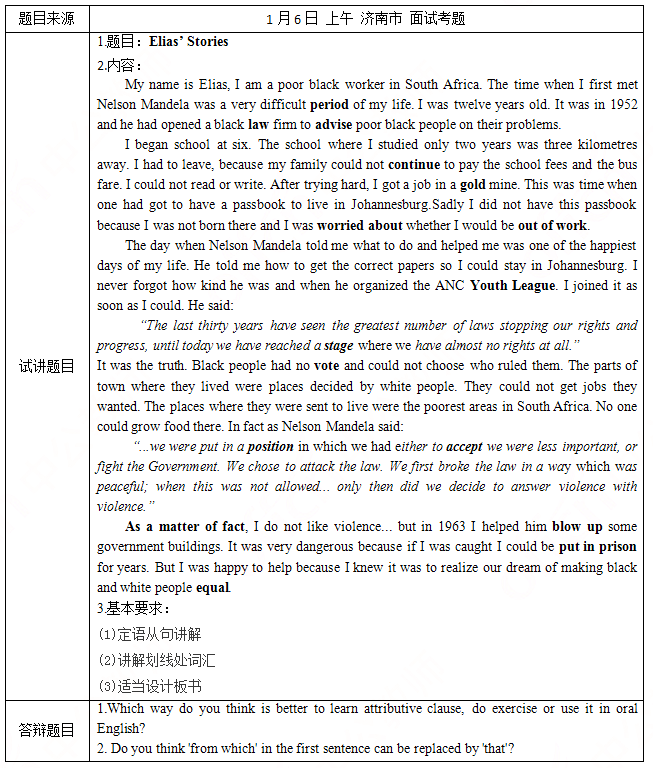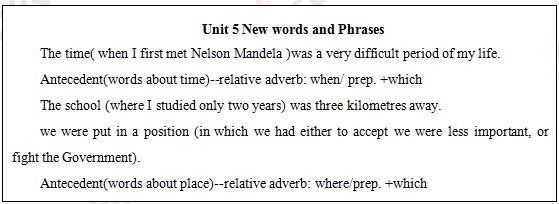高中英语?语法一、考题回顾二、考题解析【教案】Teaching aims:Knowledge aims:(1)Students are able to master the meaning of bold words and phrases: period, law, advise, gold, worried about, out of work, Youth League, stage, stage, position, as a matter of fact, blow up, put in prison, equal(2)Students can master the usage of adverb in attributive clause.(3)After this lesson, students can know the difference of usage of adverb in attributive clause and the usage of pronoun in attributive clause.Ability aim:After this lesson, students can use grammar of attributive clause in reading and writing.Emotional aim:Students are able to love learning English after this lesson.Key and difficult point:Key Point: master the meaning of words and phrases :period, law, advise,gold,worried about etc.Difficult Point: use grammar of attributive clause in reading and writingTeaching procedures:Step 1: Warming-up1. Greetings.2. Ask students to make several sentences using the grammar of usage of pronoun in attributive clause. Then write a sentence needing to use adverb in attributive clause. And then lead in the new grammar, adverb in attributive clause.Step 2: Presentation1.Ask students to open the book and read the passage to guess the meaning the bold words and then paraphrase the bold words with the help of PPT.2. Then Ask students to find out more complex sentences that the clause is after a noun or pronoun and the words that are used to introduce the sentences: where, when, why or preposition plus which.The time( when I first met Nelson Mandela )was a very difficult period of my life.The school (where I studied only two years) was three kilometres away.This was time (when one had got to have a passbook )to live in Johannesburg.we were put in a position (in which we had either to accept we were less important, or fight the Government). ...Then ask students to find the similarity of these sentences and invite several students to share their ideas. Then lead the students to conclude the rules of relative adverb in attributive clause and preposition plus which in attributive clause. (They all function as adverbials)Step 3: Practice1.Make sentences: Ask students to use the grammar that has just learnt to describe the pictures which are presented on the PPT.2.Combine the sentences: Ask students to combine the sentences according to the grammar in attributive clause.(1)This is a book. Its cover is blue. (whose)(2)He is the teacher. He helped me. (who/that)(3)Beijing is the place. I was born in this place. (where/ in which)(4)This is the hotel. You will stay at the hotel. (where/at which)Step4: Production1.Make stories: Ask students to use the grammar that has just learnt to describe the video.2.Discussion: Ask students to tell their daily life to use the grammar that has just learnt. And after 5minutes to invite several students to share their daily life.Step5: Summary and HomeworkSummary: ask a student to conclude the content of the lesson and summarize with the whole class.Homework: write a short passage about his daily life using the grammar that has just learnt.Blackboard design:1.Which way do you think is better to learn attributive clause, do exercise or use it in oral English?2. Do you think 'from which' in the first sentence can be replaced by 'that'?
高中英语?语法
一、考题回顾

二、考题解析
【教案】
Teaching aims:
Knowledge aims:
(1)Students are able to master the meaning of bold words and phrases: period, law, advise, gold, worried about, out of work, Youth League, stage, stage, position, as a matter of fact, blow up, put in prison, equal
(2)Students can master the usage of adverb in attributive clause.
(3)After this lesson, students can know the difference of usage of adverb in attributive clause and the usage of pronoun in attributive clause.
Ability aim:
After this lesson, students can use grammar of attributive clause in reading and writing.
Emotional aim:
Students are able to love learning English after this lesson.
Key and difficult point:
Key Point: master the meaning of words and phrases :period, law, advise,gold,worried about etc.
Difficult Point: use grammar of attributive clause in reading and writing
Teaching procedures:
Step 1: Warming-up
1. Greetings.
2. Ask students to make several sentences using the grammar of usage of pronoun in attributive clause. Then write a sentence needing to use adverb in attributive clause. And then lead in the new grammar, adverb in attributive clause.
Step 2: Presentation
1.Ask students to open the book and read the passage to guess the meaning the bold words and then paraphrase the bold words with the help of PPT.
2. Then Ask students to find out more complex sentences that the clause is after a noun or pronoun and the words that are used to introduce the sentences: where, when, why or preposition plus which.
The time( when I first met Nelson Mandela )was a very difficult period of my life.
The school (where I studied only two years) was three kilometres away.
This was time (when one had got to have a passbook )to live in Johannesburg.
we were put in a position (in which we had either to accept we were less important, or fight the Government). ...
Then ask students to find the similarity of these sentences and invite several students to share their ideas. Then lead the students to conclude the rules of relative adverb in attributive clause and preposition plus which in attributive clause. (They all function as adverbials)
Step 3: Practice
1.Make sentences: Ask students to use the grammar that has just learnt to describe the pictures which are presented on the PPT.
2.Combine the sentences: Ask students to combine the sentences according to the grammar in attributive clause.
(1)This is a book. Its cover is blue. (whose)
(2)He is the teacher. He helped me. (who/that)
(3)Beijing is the place. I was born in this place. (where/ in which)
(4)This is the hotel. You will stay at the hotel. (where/at which)
Step4: Production
1.Make stories: Ask students to use the grammar that has just learnt to describe the video.
2.Discussion: Ask students to tell their daily life to use the grammar that has just learnt. And after 5minutes to invite several students to share their daily life.
Step5: Summary and Homework
Summary: ask a student to conclude the content of the lesson and summarize with the whole class.
Homework: write a short passage about his daily life using the grammar that has just learnt.
Blackboard design:

1.Which way do you think is better to learn attributive clause, do exercise or use it in oral English?
2. Do you think 'from which' in the first sentence can be replaced by 'that'?
一、考题回顾

二、考题解析
【教案】
Teaching aims:
Knowledge aims:
(1)Students are able to master the meaning of bold words and phrases: period, law, advise, gold, worried about, out of work, Youth League, stage, stage, position, as a matter of fact, blow up, put in prison, equal
(2)Students can master the usage of adverb in attributive clause.
(3)After this lesson, students can know the difference of usage of adverb in attributive clause and the usage of pronoun in attributive clause.
Ability aim:
After this lesson, students can use grammar of attributive clause in reading and writing.
Emotional aim:
Students are able to love learning English after this lesson.
Key and difficult point:
Key Point: master the meaning of words and phrases :period, law, advise,gold,worried about etc.
Difficult Point: use grammar of attributive clause in reading and writing
Teaching procedures:
Step 1: Warming-up
1. Greetings.
2. Ask students to make several sentences using the grammar of usage of pronoun in attributive clause. Then write a sentence needing to use adverb in attributive clause. And then lead in the new grammar, adverb in attributive clause.
Step 2: Presentation
1.Ask students to open the book and read the passage to guess the meaning the bold words and then paraphrase the bold words with the help of PPT.
2. Then Ask students to find out more complex sentences that the clause is after a noun or pronoun and the words that are used to introduce the sentences: where, when, why or preposition plus which.
The time( when I first met Nelson Mandela )was a very difficult period of my life.
The school (where I studied only two years) was three kilometres away.
This was time (when one had got to have a passbook )to live in Johannesburg.
we were put in a position (in which we had either to accept we were less important, or fight the Government). ...
Then ask students to find the similarity of these sentences and invite several students to share their ideas. Then lead the students to conclude the rules of relative adverb in attributive clause and preposition plus which in attributive clause. (They all function as adverbials)
Step 3: Practice
1.Make sentences: Ask students to use the grammar that has just learnt to describe the pictures which are presented on the PPT.
2.Combine the sentences: Ask students to combine the sentences according to the grammar in attributive clause.
(1)This is a book. Its cover is blue. (whose)
(2)He is the teacher. He helped me. (who/that)
(3)Beijing is the place. I was born in this place. (where/ in which)
(4)This is the hotel. You will stay at the hotel. (where/at which)
Step4: Production
1.Make stories: Ask students to use the grammar that has just learnt to describe the video.
2.Discussion: Ask students to tell their daily life to use the grammar that has just learnt. And after 5minutes to invite several students to share their daily life.
Step5: Summary and Homework
Summary: ask a student to conclude the content of the lesson and summarize with the whole class.
Homework: write a short passage about his daily life using the grammar that has just learnt.
Blackboard design:

1.Which way do you think is better to learn attributive clause, do exercise or use it in oral English?
2. Do you think 'from which' in the first sentence can be replaced by 'that'?
参考解析
解析:1.
(1)I think, first, the best way to learn attributive clause is tell the definition of this grammar in
sentence. For example, this is a beautiful teacher (who wears the red dress )is our teacher. Then ask students to pay attention to the clause to find the features of this sentence and conclude the attributive clause: noun/pronoun plus a whole sentence. Next tell the usage of pronoun in attributive clause. Last, teach the usage of adverb in attributive clause.
(2) Exercise and oral English should use togerther in practice attributive clasue. Doing exercise can make students master the structure of this grammar easily. And oral English can make students know the real situation of attributive clause in our daily life.
2.
No, I don’t think. From which is an relative adverb from the point of grammar. And that belongs to the pronoun. So it only can be used as the subject, object and so on but can not be used as the adverb or as as phrase. And this sentence doesn’t have the adverb, so we must use from which.
(1)I think, first, the best way to learn attributive clause is tell the definition of this grammar in
sentence. For example, this is a beautiful teacher (who wears the red dress )is our teacher. Then ask students to pay attention to the clause to find the features of this sentence and conclude the attributive clause: noun/pronoun plus a whole sentence. Next tell the usage of pronoun in attributive clause. Last, teach the usage of adverb in attributive clause.
(2) Exercise and oral English should use togerther in practice attributive clasue. Doing exercise can make students master the structure of this grammar easily. And oral English can make students know the real situation of attributive clause in our daily life.
2.
No, I don’t think. From which is an relative adverb from the point of grammar. And that belongs to the pronoun. So it only can be used as the subject, object and so on but can not be used as the adverb or as as phrase. And this sentence doesn’t have the adverb, so we must use from which.
相关考题:
基础部分的顺序:基本语法,类相关的语法,内部类的语法,继承相关的语法,异常的语法,线程的语法,集合的语法,io 的语法,虚拟机方面的语法,其他1、一个".java"源文件中是否可以包括多个类(不是内部类)?有什么限制?
单选题高中英语学业质量水平中,水平一是高中学生在英语学科应达到的合格要求,也是()命题的主要依据。A英语高考命题B高中英语学业水平考试命题C高中英语测评命题D其他相关考试